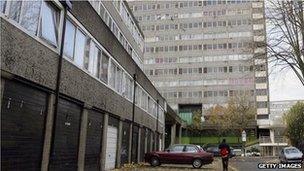Shelter Scotland in 'bedroom tax' cash plea
- Published

The reform affects tenants renting from a local authority, housing association or social landlord
Housing charity Shelter Scotland has urged the Scottish government to make up to £50m available to help tackle the impact of the so-called bedroom tax.
The call is part of a three-point plan it wants to discuss in an "emergency summit" of social landlords.
Under UK welfare reform plans, social housing tenants will lose a portion of their benefit if they are deemed to be under-occupying their home.
Shelter warned the move would hit almost 100,000 households from April.
But the Department for Work and Pensions said it had provided UK councils with a £155m discretionary fund in order to help those affected by the changes.
Last week, Work and Pensions Secretary Iain Duncan Smith instructed officials to "look again" at how the reform would affect disabled people, after concerns were raised by charities.
The UK government argues the changes would help cut the £23bn annual bill for housing benefit, free up more living space for overcrowded families, and encourage people to get jobs.
Summit call
Shelter Scotland director Graeme Brown called for Scottish ministers to set up a summit of social landlords to discuss the plans.
He said: "We agree with the Scottish government that the UK government must reverse these cuts and that Scottish ministers are not able to mitigate all the impact of these reforms.
"But Scottish ministers are not powerless to act to protect council tax payers who will have to foot the bill of increased homelessness or those vulnerable tenants at risk of losing their home.
"That's why we think the Scottish government should make up to £50m available to help mitigate the impact of the first year of the bedroom tax and give practical help to all set to lose out."
Three-point plan
The charity's three-point plan also calls for a guarantee that no-one should be evicted for bedroom tax arrears or deemed intentionally homeless if they are evicted for that reason.
Shelter Scotland's approach came as the Scottish government said it had calculated that eight out of 10 households that would be affected by the change included an adult with a recognised disability.
A Scottish government spokesman said it was doing everything it could to "mitigate some of the worst of the UK welfare budget cuts", including making up the shortfall on council tax benefit.
He added: "That's not all - we are protecting university education, personal care for our older people and we're paying a living wage because we know society is more than the sum of its parts.
"But in the face of Westminster cuts to Scotland's budget, ultimately, the work we are doing can only go so far.
"Whilst we share Shelter's views on the bedroom tax, this emphasises the need for Scotland to be independent, so we can build a society that reflects our shared values."
Discretionary fund
A DWP spokesman said: "We have provided councils with a £155m discretionary fund in order to help those affected by the changes such as disabled people.
"However, with two million people on the housing waiting list and around one million empty bedrooms, it is only fair that we make proper use of social housing."
He added: "The same rules already apply to those in the private rental sector."
The new housing support provisions will affect working age tenants renting from a local authority, housing association or social landlord.
Housing benefit is to be based on the "need" of the household, assuming one bedroom for each person or couple.
Exceptions include children of the same gender under 16, who are expected to share, and disabled tenants or partners who need a non-resident overnight carer.
Tenants in social housing will have their benefit reduced by 14% if they have a spare bedroom, or 25% if they have two or more extra rooms.
- Published21 February 2013
- Published7 February 2013
- Published11 February 2013
- Published30 July 2013
- Published6 February 2013